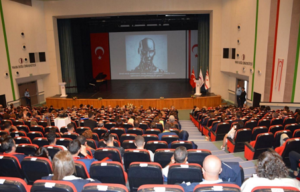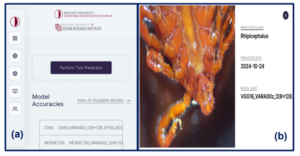The International Research Center for AI and IoT, established at Near East University, covers and generate significant publications (books, journals, and conference articles) in various computing disciplines in the following areas:
Machine Learning and Artificial Intelligence Applications, Cognitive Next Generation Networks, Human-Machine (H2M) Interfaces, 6G and Beyond Communications, Smart Multimedia Services, Smart Spaces and the Internet of Things.
Directors: Prof.Dr. Mustafa Kurt, Prof.Dr. Fadi Al-Turjman
Researchers: Gresmarteneanos Tannous, Ibrahim Ame, Cliford Mlimwa, Usman Sarumi, Zöhre Serttaş Yırtıcı, Sinem Alturjman
Some of the projects carried out at the International Research Center for AI and IoT:

Smart Education System: Ai.Prof.Dux
As artificial intelligence technologies have made great progress in academic fields, a new era has opened by fundamentally changing the traditional education paradigm. Prof. DUX, which was developed using the GPT3.5 and GPT4 infrastructure by the Artificial Intelligence and Robotics Institute and International Research Center for AI and IoT.

The system, which was developed during the 2022-2023 academic year, started its active education-training period for the first time in the 2023-2024 academic year. Ai. Prof. DUX, who initially taught two courses in the fall semester of the relevant period at the Artificial Intelligence Engineering Department of Near East University, has been used in many faculties throughout the university since then.
Easy, Fast and Accurate Diagnosis of Monkeypox Virus with an Artificial Intelligence Based Application
Monkeypox (Mpox) virus continues to be a global health threat, with over 100,000 confirmed cases and 220 deaths reported in over 120 countries since January 2022. Recent increases in cases in the Democratic Republic of the Congo and other African countries have raised concerns. Mpox is primarily spread through close contact, including skin-to-skin, mouth-to-mouth, and respiratory interactions. Symptoms range from a few lesions to extensive rashes, making it difficult to distinguish from conditions such as chickenpox, measles, herpes, and other infections. Therefore, this project aims to develop an AI-based application for rapid and accurate diagnosis of Mpox from skin lesion images, guiding clinicians in making a diagnosis.
Smart Beekeeping- An AI Powered Approach for Beehive Management and Monitoring
Global warming and climate change, one of the environmental problems, have emerged as a result of overexploitation of natural resources and disruption of natural balances. In bee ecology and honey bee behavioral ecology research, it is inevitable to use smart and new technologies to monitor climate change and adapt effective hive management. The aim of this project is to design, develop and implement a smart hive management and monitoring system that allows beekeepers to monitor hives remotely through sensors and wireless network technologies.
AI enabled Health Care App
NEUBT Barrier-Free Transportation Mobile Application was developed by Artificial Intelligence and Robotics Institute and International Research Center for AI and IoT. The application is also integrated into Smart Campus application. The purpose of NEUBT Mobile Application is to provide access to the service stops, school and faculties of students with special education needs. Since the physical condition of the services currently used in the school does not provide suitability for the use of disabled students, an organization can be established to provide access to the desired location by requesting a student service.

Artificial Intelligence/Internet of Things (AI/IoT) Enhanced Tick Classification Mobile Application
Ticks play a vital role in the global ecosystem as they serve as vectors of diseases affecting humans and animals. Once they enter the human host, they can cause disease, paralysis, and to some extent, death. The classification of ticks is mostly done by experienced biologists, veterinarians, and farmers. Therefore, it is very important for the public to be able to distinguish between the dangerous and safe species. The main objective of this study is to develop and implement an AI/IoT-based platform for tick classification. In line with the application of Artificial Intelligence (AI)-based models and IoT-based frameworks, we have proposed a platform known as I-TickNet for accurate classification of ticks.